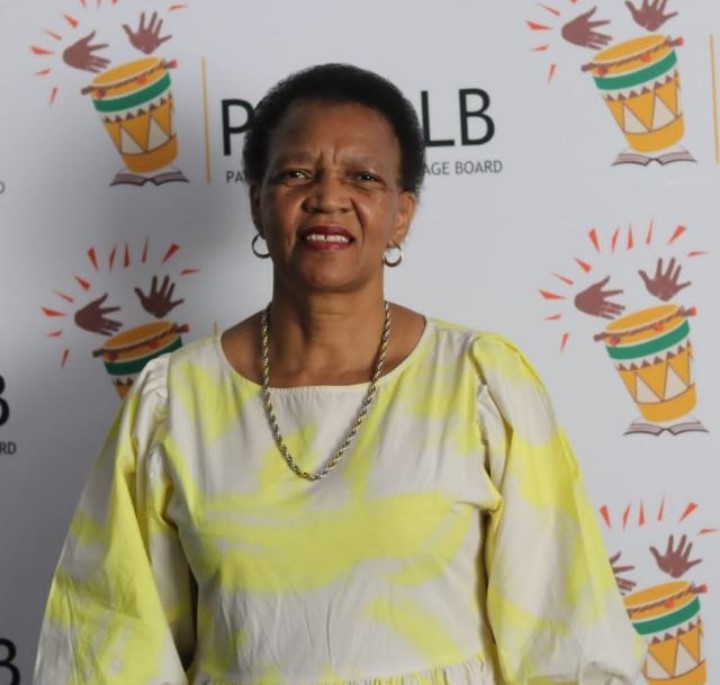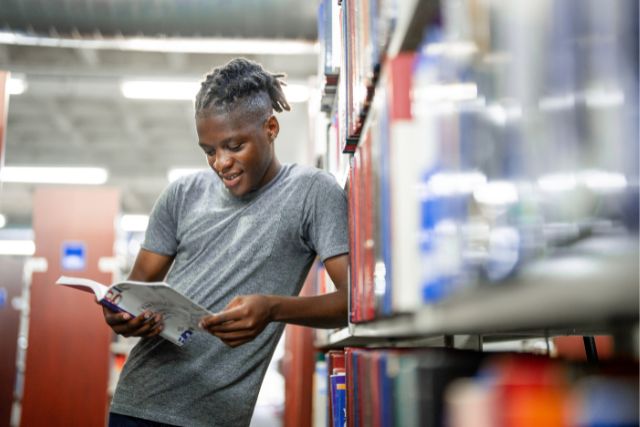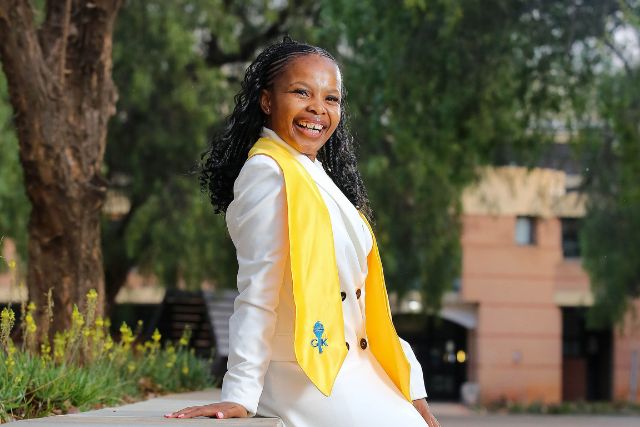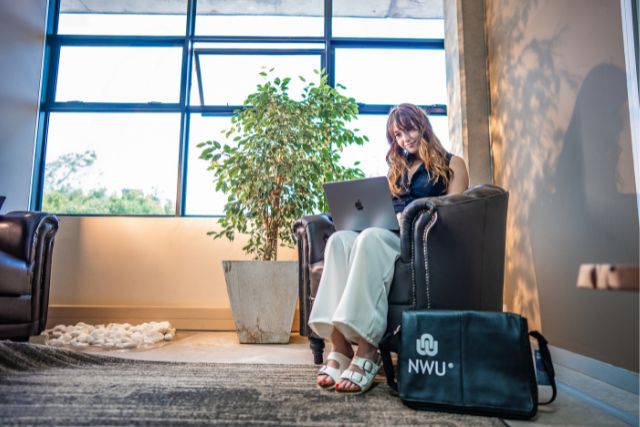What does it take to truly transform language education in South Africa, and how can today’s postgraduate students lead that change? In this thought-provoking interview, we sit down with Dr Dolly Dlavane, an esteemed academic and the Director of the Centre for African Language Teaching (CALT) at North-West University (NWU). With her rich experience across educational phases, from Foundation Phase to PhD supervision, Dr Dlavane shares powerful insights on multilingual pedagogy, the importance of academic progression in language fields, and the crucial role of community engagement in research.

Whether you're navigating your postgraduate journey or are passionate about preserving and elevating African languages, this conversation offers motivation, wisdom, and practical strategies for becoming a catalyst for change.
Your expertise spans various educational phases, from Foundation to PhD level. How can postgraduate students in language-related fields leverage this understanding of the educational pipeline to inform their research and contribute meaningfully to language development in schools?
One of the most important things in academia is staying focused and clearly identifying your area of interest, especially in language education. This clarity often comes through consistent reading, engaging with current research, and understanding the ongoing discourse within the field. Staying informed about developments in language education and attending relevant conferences, initiatives, or events—whether formally invited or not—are crucial steps.
Networking is equally vital. Building relationships with others in your field means you’ll be more likely to hear about relevant opportunities, trends, and conversations that matter. Unfortunately, many language education students do not pursue further studies after completing their undergraduate degrees. Instead, they move directly into teaching and often remain there without seeking further academic growth. It’s easy to fall into that trap, especially if you isolate yourself and avoid interacting with professionals in your area of interest.
Pursuing higher qualifications is important—not only to deepen your pedagogical knowledge in your subject of specialisation but also to stay aligned with the latest innovations in education. Students should also be aware that many schools still do not prioritise language education, particularly when it comes to previously marginalised African languages. It is critical for new educators to enter the system with this awareness—and with a passion for being advocates of change.
Multilingual pedagogies are a key area of your expertise. How can postgraduate students researching in this field effectively engage with and learn from diverse linguistic communities, especially if their research involves distance-based data collection or interaction?
It warms my heart to see that our postgraduate students have recently developed a growing interest in researching and understanding multilingual education. While they have not yet ventured into distance-based data collection, their current focus remains on desktop research and face-to-face engagement. This foundation provides a strong starting point, and I look forward to seeing how their methodologies evolve as they explore more diverse and flexible approaches in the future.
However, multilingual researchers need to be flexible in the tools and platforms they use. Technology can bridge gaps, but it must be adapted to the digital realities of the communities involved. For instance, in my experience working with distant participants, where internet access is limited, asynchronous communication methods like WhatsApp voice notes or SMS-based surveys may be more appropriate than Zoom interviews. Virtual platforms require internet access.
Lastly, students should see themselves as learners, not just researchers. Engaging with diverse linguistic communities is not just a research activity; it’s an opportunity to learn from lived experiences, ways of knowing, and local pedagogies that can enrich their academic work and personal growth.
In essence, even at a distance, it is possible and necessary for postgraduate students to foster meaningful, reciprocal relationships with linguistic communities. This ensures that their research is relevant and transformative.
Many students juggle work and studies, especially distance learners and postgraduate students. Drawing from your experience in academia, what are some effective time management and self-care strategies you would recommend in maintaining a healthy balance?
I must admit, this is a challenging question. But in short, I believe that staying focused and keeping your goals in sight is the driving force behind true achievement. Making the most of every minute is also key. When you’re aware of an upcoming deadline or submission, it naturally encourages you to plan and stay on track, ultimately helping you work toward achieving your goals.
What resources or support systems, both within and outside the university, would you advise distance learners and postgraduate students in African language-related fields to actively seek out and utilise?
Postgraduate and distance learners in African languages education can thrive when they tap into the right resources and support systems. First and foremost, students should fully explore what the university or the Faculty of Education offers. This includes access to academic supervisors, research support offices, writing workshops, library databases, and language departments. Building strong relationships with supervisors and mentors is particularly crucial—they are not only guides in academic work but also connectors to relevant networks and opportunities.
Outside the university, students should actively engage with African languages professional associations and language teaching professional bodies such as SAALT and networks related to African languages and multilingual education. These include academic societies, language advocacy groups, and online communities where researchers and practitioners share ideas and opportunities. Participating in webinars, conferences (even virtually), and forums focused on indigenous languages and multilingual pedagogies can offer both inspiration and practical insight.
I have come to realise that once students graduate and enter the education system, they often become disconnected from the university and their field of expertise, particularly in languages. However, it shouldn't be this way.
Social media and digital platforms also serve as valuable spaces for learning and collaboration. Platforms like Twitter, ResearchGate, and LinkedIn host vibrant academic communities where scholars regularly share resources, publications, and calls for papers or grants, many of which are relevant to African languages and multilingual education
One of the most crucial support systems outside the university is your family and close friends. It's important that they understand the demands of your academic journey and why you may sometimes seem distant or unavailable. Their understanding can make all the difference in providing the emotional and practical support you need.
I also recognise that not all families are immediately supportive—some may feel frustrated or disconnected from your academic path. But even having just one encouraging family member or a positive colleague you can turn to—whether to share challenges or celebrate small victories (e.g. submitting a chapter) —can be incredibly powerful. That kind of support is vital for staying motivated and emotionally grounded throughout the postgraduate journey
As a Senior Lecturer with a rich academic background, what is one crucial piece of advice you would give to students, both on-campus and distance learners, who are passionate and want to pursue further studies or careers in related fields?
I always tell them that I have been there, I know what is in there. However, focus is key.
We know you're passionate about African languages. If you could instantly give every student the ability to speak one additional African language fluently, which one would you choose and why?
If I could instantly give every student the ability to speak one additional African language fluently, I would choose Setswana, my mother tongue.
Remember that a language is developed and grows from being spoken and used. The more speakers who will be able to speak Setswana, the better for Setswana to develop. This is so because new terminologies are experienced in the process, and these new words can be saved digitally and accessed digitally. I remember reading a piece some 30 years ago where an author was explaining that Afrikaans did not just develop out of the blue, instead, they welcomed all speakers who had an interest in a language, who tried by trial and error to speak Afrikaans. If African language speakers learn that a language grows by speaking it, Batswana will go in communities to the market where Setswana be spoken by their communities.
Setswana is spoken across multiple provinces in the country, South Africa and extends beyond the borders to countries like Botswana, Namibia, Zimbabwe, Malawi, and Zambia. Its widespread use makes it a valuable tool for fostering communication and building connections across Southern Africa. Mastery of Setswana not only enhances understanding and collaboration within these regions but also promotes the appreciation of a rich cultural and linguistic heritage that is central to many communities.
If you could have a coffee chat with any historical figure who championed language or education, who would it be and what would you ask them?
If I could have a coffee chat with any historical figure who championed language and education, it would be Solomon Tshekisho Plaatje. As one of the founding members of the ANC, a prolific writer, journalist, translator, and a passionate advocate for African languages, Plaatje played a vital role in preserving and promoting Setswana and documenting African experiences under colonial rule.
I would ask him how he managed to remain so committed to language activism and cultural preservation during such an oppressive political climate. I would also be curious to know what inspired his multilingualism and how he viewed the role of African languages in shaping identity, unity, and education. Most of all, I would want his insight on how we, as modern educators and researchers, can continue his legacy, especially in revitalising Indigenous languages in formal education systems
What's a local hidden gem or spot in Potchefstroom or Vaal, or Mahikeng that you enjoyed and would recommend to students?
One local gem I would highly recommend, especially to students in Potchefstroom, the NWU Botanical Garden is a quiet, beautiful retreat. It's perfect for reading, reflecting, or taking a much-needed mental break from academic pressure. It’s also great for inspiration, especially if you’re working on language or culture-related research and just need to think in peace.



